 |
 |
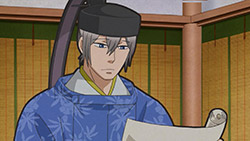 |
 |
 |
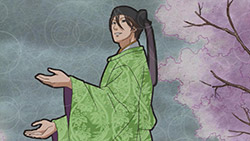 |
 |
 |
 |
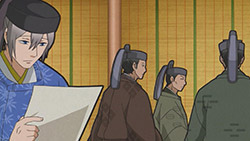 |
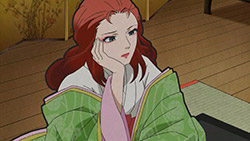 |
 |
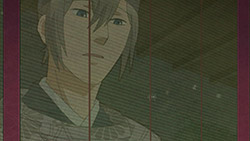 |
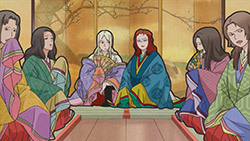 |
 |
 |
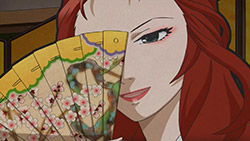 |
 |
 |
 |
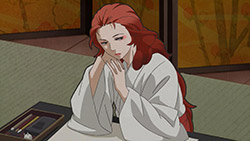 |
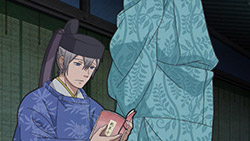 |
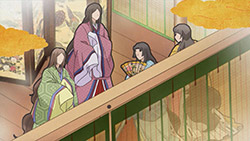 |
 |
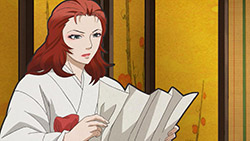 |
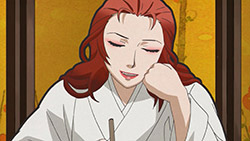 |
 |
 |
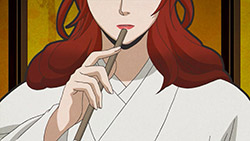 |
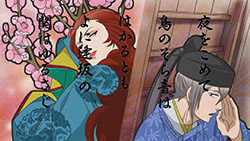 |
 |
 |
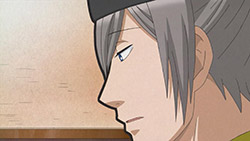 |
 |
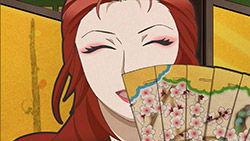 |
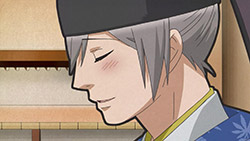 |
「少納言と行成 清少納言」 (Shounagon to Yukinari Sei Shounagon)
“Shounagon and Yukinari Sei Shounagon”
Even though the living conditions of the past are simplified and primitive by today’s standards, love has never seemed so complicated. Social status dictates the likelihood of a match, whether or not genuine feelings are involved. Politics also weave its way here and there, standing in the way of what should be “love”, much like in the case of Nagiko and Yukinari (Terashima Takuma). Although the episode ends on an upbeat note their situation is much too complicated for a completely happy ending; putting aside how guarded Nagiko is, there is also the issue of their positions in the palace, and the fact she has a reputation to uphold as Sei Shounagon, attendant to imperial bride Teishi (Orikasa Fumiko). It’s rather bittersweet to see her place her forlorn mistress’s well-being above her own, but it’s also quite impressive of her to take her duty so seriously that she is willing to forsake pursuing her heart’s desire. At the same time however, given the events of last episode, her actions are understandable; having been left behind once, how can she give away her heart so easily?
Yukinari, however, is persistent yet pliable enough in his advances that he might be able to convince Nagiko to accept his romantic gestures further down the line (but I think historically, she ends up with another Fujiwara, so maybe he’s friendzoned for life). Despite his dour and dry nature, he is actually quite sentimental at heart, valuing the intricacies of real friendships over the fleeting acquaintances that pepper the royal court. Perhaps this is because he can afford to be choosy with the people he keeps company with, but whatever the case, Yukinari approaches everything with a high degree of sincerity and seriousness that comes across as unfriendliness and even condescension in the eyes of those who aren’t used to acting with honest intentions. There is something highly endearing about the way he conducts himself despite being so dry of humor and overly blunt – it is precisely his candor that distinguishes himself from the other men at court however, giving him a firm grasp on his identity that most of them don’t have. There is nothing hidden in his intentions and his words have that much more value because each of them are spoken with purpose and sincerity; his conduct is highly reflective of his “quality over quantity” philosophy.
One last thing I’ll comment on is the friendship between Teishi and Nagiko – relationship between women, platonic or not, have not been showcased in Uta Koi so far. Their camaraderie is both organic and sweet, and I do hope they portray more of it since it’s a rich world to explore. Teishi especially seems like quite the tragic character, her life dictated by the moving political forces. Her brief scene with Nagiko was quite touching and spoke volumes about the bond they shared not just as imperial bride and attendant, but as true friends.
Hyakunin Isshu #62 by Sei Shounagon
The rooster’s crowing
In the middle of the night
Deceived the hearers;
But at Osaka’s gateway
The guards are never fooled.
The biggest metaphor of the poem is most definitely the gates of Osaka. As an extremely well-guarded gate, not even a brilliant strategy once used by a cunning general can trick them into opening it. It works well in describing a person’s heart or mind – the same principles can be applied. If the gates of Osaka were referencing the matters of love, for example, the rooster’s crowing can be seen as a deceitful suitor, or a fickle courtier who is unwilling to wait, seeking to “streamline” the emotional process by trickery. The comparison is also in line with the theme of politics, the guards representing a shrewd servant of the court perhaps, who isn’t won over so easily by empty words and the never-ending dance of power plays and cunning schemes.
Whatever the original purpose of the poem is, it contains a concise and flexible metaphor that can be applied to many different situations to provide an elegant yet snappy criticism of the deceit people so often use to get their way.
Full-length images: 1, 3, 4, 5, 6, 9, 10, 11, 12, 13, 14, 17, 20, 21, 22, 23, 25, 26, 27, 28, 29, 30, 31, 33, 35.
Important Note: I apologize for the delay – I’m moving currently, so things have been hectic. Next (possibly two) weeks will be delayed as well, but I’ll try my best to stay on top of things!
Preview
 |

I was glad they twisted the whole gates metaphor in a dirty way. I was waiting for it and Yukinari didn’t fail to deliver. I think friendship has been explored before in Yasuhide and Komachi but I will agree with you that it did not feel organic the way Yukinari and Shonagon’s relationship does. But honestly I’m rooting for the dude! Yukinari deserves her! He was really adorable throughout the episode.
praise to Yukinari for his perseverance, even though he was still rejected at the end.
Sanekata appears! please continue to be relevant, because you look like the only one who can handle Kinto (who’s such a meanie!).
just a little nitpick Mochi, Teishi is voiced by Orikasa Fumiko, not HanaKana. (ref: http://www.tv-tokyo.co.jp/anime/utakoi/chara/index.html#133482)
Oh snap – sorry! I saw the casting news for KanaHana a while back and Teishi sounded familiar, so I just assumed in my haste OTL In any case, thanks for pointing it out! <3
I’m agreeing with you there, Bakamochi; more of Teishi and Nagiko would be most welcome. So many people have yuri goggles on nowadays that shows pander just to their likes only when it comes to female relationships. Girls can be good friends too!! 😀